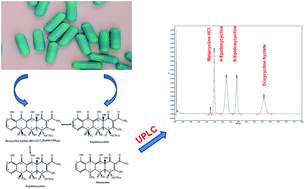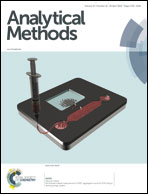Development and validation of a stability-indicating ultra-performance liquid chromatography (UPLC) method for doxycycline hyclate: an optimization of the analytical methodology for a medical countermeasure (MCM) drug
Abstract
Doxycycline hyclate (DOX) is a broad-spectrum anti-infective drug that can be administered for post-exposure prophylaxis (PEP) following exposure to aerosolized spores of Bacillus anthracis and it may be used for acute radiation syndrome (ARS). Because of this public health importance, several federal, state, and local public health and emergency response stakeholders stockpile doxycycline tablets or capsules as medical countermeasures (MCMs). A robust and efficient ultra-performance liquid chromatography (UPLC) method was developed and validated for the simultaneous determination and quantification of doxycycline hyclate and its impurities to enhance the efficiency of control strategies over the product lifecycle. The chromatography was performed on a Waters UPLC system using an Acquity BEH C18 (2.1 × 50 mm, 1.7 μm) column maintained at 55 °C. Doxycycline and its degradation and synthetic impurities were eluted isocratically with 75 mM ammonium acetate, 4 mM EDTA (pH 8.8) and acetonitrile (97 : 3) as the mobile phase with a flow rate of 1.2 mL min−1 and ultraviolet detection at 270 nm. Baseline separation of the analytes was achieved in 6 min. The UPLC method was demonstrated to be stability-indicating after forced degradation studies were conducted on doxycycline hyclate under standard stress conditions of oxidation, photolysis and hydrolysis. The method was validated according to United States Pharmacopoeia (USP) General Chapter 〈1225〉 and was found to be selective, robust, accurate, precise, and reproducible for the simultaneous in vitro quantitation of doxycycline hyclate and its degradation impurities. The method was successfully applied for the quality assessment of current marketed doxycycline hyclate products.



 Please wait while we load your content...
Please wait while we load your content...